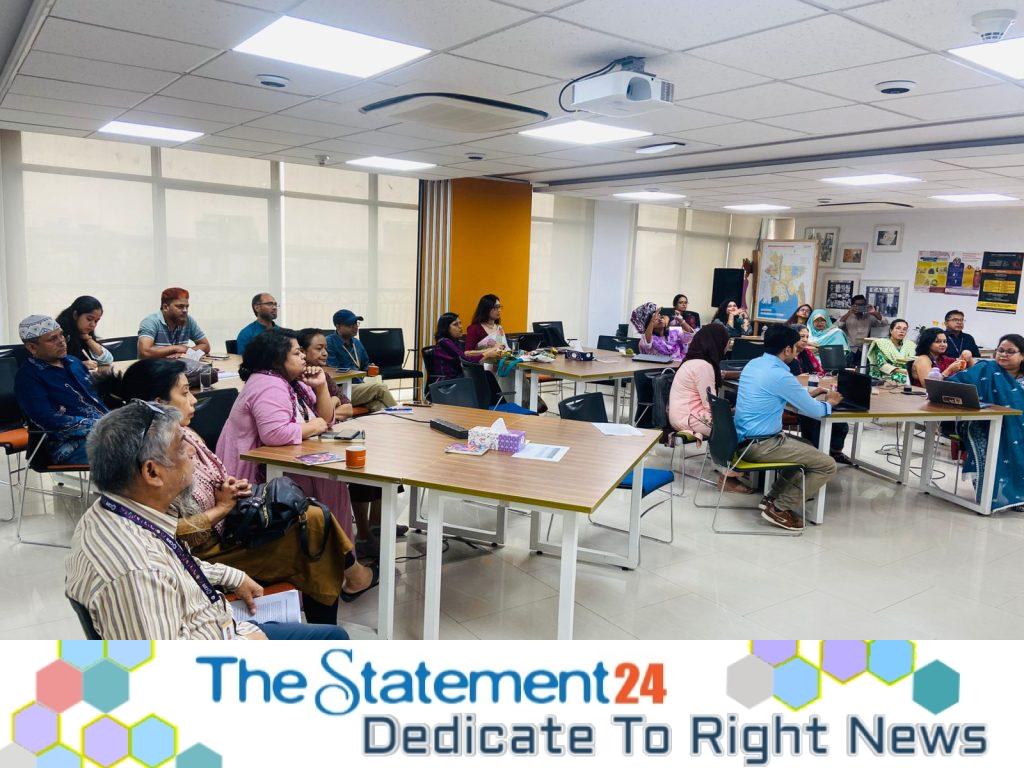
CARE Bangladesh organized an in-house workshop titled ‘Workshop on GBV in Bangladesh: Sharing Preliminary Findings and Shaping Future Directions’ to share the findings of a study conducted in collaboration with JAAGO Foundation and icddr, b. The study aimed to measure the national prevalence of intimate partner violence (IPV) in Bangladesh. This research is crucial, as nearly a decade has passed without updated information on this issue, with the last Violence Against Women survey being conducted in 2015.
Ram Das, Country Director, CARE Bangladesh, inaugurated the event with his opening remarks where he emphasized that women and girls are central to CARE’s focus, noting that empowering women is crucial for gender equality. Citing a Sanskrit text, he shared, “The Creator rejoices when women are respected,” and urged stronger responsiveness to women’s voices to address GBV, as dignity and respect are essential for true development.
Fatima Jahan Seema, Lead program Analytics, CARE Bangladesh, and Sultan Mahmud, Assistant Scientist, icddr, b, presented the study fundings. The study was conducted in 7 divisions of Bangladesh with a sample size of 1715 through face-to-face interviews with women aged 15 or older who reside in their households. 95% of the participants were married, and their mean age is 29. When compared with the National VAW 2015 survey findings, the data showed an increase in the prevalence of any intimate partner violence (IPV), rising from 80% in 2015 to 89% in 2024. Awareness on ‘where to report violence’ remained the same as 2015. However, knowledge of the government helpline saw a significant increase, rising from 2% in 2015 to 17% in 2024. 44% of women aged 25-34 and 37% of women aged 45-54 reported physical violence. Regarding sexual violence, younger women were more likely to experience it compared to older age groups.
The study reveals that reducing violence against women (VAW) requires a multi-faceted approach that addresses both systemic and societal factors. Key recommendations include expediting convictions in gender-based violence (GBV) cases, which could deter perpetrators and provide justice to victims more swiftly. Increasing civic education on GBV is also essential to raise awareness and empower communities to identify and counteract abusive behaviors. Moreover, enhancing services that prevent violence and protect victims’ rights can create safer environments for those at risk. Addressing harmful social and cultural norms that perpetuate violence, alongside efforts to reduce gender inequality, is critical for fostering long-term change and building a more inclusive, respectful society.
Gender-based violence (GBV) is one of the most widespread human rights abuses in the world, affecting individuals everywhere, with consequences that reach beyond the individual and can affect entire families and communities. Gender equality is the central organizing principle of CARE’s Vision 2030 and is at the heart of CARE’s programmatic and organizational ambitions and targets. CARE’s work with allies and partners to advance gender equality for more than 30 years in over 100 countries has shown that supporting gender equality is critical to ending poverty.
After sharing the study findings, experts dived into a group discussion followed by a plenary about the existing challenges and way forward on GBV prevention, mitigation, and response. Mehrul Islam, Interim Deputy Country Director – Programs, CARE Bangladesh, shared the closing remarks and said, “Our progress on other fronts reminds us that we can do more for GBV prevention. By working together—with academia, research institutions, and all stakeholders—we can lay the foundation for a more equitable and resilient society.”
A distinguished panel of experts, academicians, and development practitioners attended the workshop, along with key members of staff from CARE Bangladesh, JAAGO Foundation, and icddr, b.

